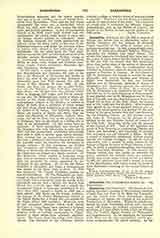

Alexandria, COUNCILS OF.—In 231 a council of bishops and priests met at Alexandria, called by Bishop Demetrius for the purpose of declaring Origen unworthy of the office of teacher, and of excommunicating him. In 306, a council held under St. Peter of Alexandria deposed Meletius, Bishop of Lycopolis, for idolatry and other crimes. The schism then begun by him lasted fifty years and was the source of much sorrow for the Church of Egypt. In 321 was held the council that first condemned Arius, then parish priest of the section of Alexandria known as Baucalis. After his condemnation Arius withdrew to Palestine, where he secured the powerful support of Eusebius of Caesarea. At the Council of 326, St. Athanasius was elected to succeed the aged Alexander, and various heresies and schisms of Egypt were denounced. In 340, one hundred bishops met at Alexandria, declared in favor of Athanasius, and vigorously rejected the calumnies of the Eusebian faction at Tyre. At a council in 350, St. Athanasius was replaced in his see. In 362 was held one of the most important of these councils. It was presided over by St. Athanasius and St. Eusebius of Vercelli, and was directed against those who denied the divinity of the Holy Ghost, the human soul of Our Lord, and His Divinity. Mild measures were agreed on for those apostate bishops who repented, but severe penance was decreed for the chief leaders of the great heresies that had been devastating the Christian Church. In 363, another council met under St. Athanasius for the purpose of submitting to the new Emperor Jovian an account of the true faith. Somewhat similar was the purpose of the Council of 364. That of 370 approved the action of Pope Damasus in condemning Ursacius and Valens (see Arianism), and expressed its surprise that Auxentius was yet tolerated at Milan. In 399, a council of Alexandria condemned, without naming himself, the writings of Origen. In 430, St. Cyril of Alexandria held a council to make known to the bishops of Egypt the letter of Pope Celestine I (422-432), in which a pontifical admonition was conveyed to the heresiarch Nestorius. In this council the bishops warned him that unless he retracted his errors, confessed the Catholic faith, and reformed his life, they would refuse to look on him as a bishop. In 633, the patriarch Cyrus held a council in favor of the Monothelites, with which closed the series of these deliberative meetings of the ancient Church of Egypt.
THOMAS J. SHAHAN

